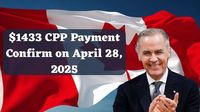As Canadian seniors approach retirement, many are set to receive significant financial support through the Canada Pension Plan (CPP) and other federal benefits, with the Canada Revenue Agency (CRA) confirming a maximum monthly payment of $1,433 starting April 28, 2025. This increase, driven by a 2.7% adjustment for inflation, aims to provide essential income support for retirees who have contributed to the program during their working years.
The CPP serves as a cornerstone of Canada's retirement income system, and this year, its benefits have been adjusted to better reflect the rising costs of living. For 2025, the minimum monthly benefit will start at $1,360, with the maximum amount set at $1,433. These figures underscore the government's commitment to supporting senior citizens as they transition into retirement.
Eligible seniors can apply for CPP benefits once they reach the age of 60 and have made at least one valid contribution to the CPP during their working life. It is crucial for applicants to understand that receiving these benefits is not automatic; they must complete an application process through the CRA.
The upcoming payment date for the CPP benefits is April 28, 2025, and this will be a monthly payment distributed directly into the beneficiaries' bank accounts. Seniors are encouraged to ensure their banking information is current to avoid any delays in receiving their funds.
To qualify for the $1,433 CPP payment, applicants must meet specific criteria established by the CRA. They must be residents of Canada, aged 60 or older, and have made valid contributions to the CPP during their employment years. The amount received can vary based on total contributions, the number of contributory years, and the age at which they begin receiving their pension.
For those considering delaying their CPP benefits until age 70, this could result in increased monthly payments, sometimes exceeding $2,034. This option is particularly appealing for individuals who can afford to wait, as it significantly boosts their retirement income.
In addition to the CPP, many seniors will benefit from other federal programs such as the Old Age Security (OAS) and the Guaranteed Income Supplement (GIS). These programs can combine to provide substantial monthly income, with some seniors potentially receiving over $2,500 per month. For instance, a single low-income senior aged 75 could receive approximately $3,320.32, combining $1,433 from CPP, $800.44 from OAS, and $1,086.88 from GIS.
The OAS benefit is available to Canadians aged 65 and older who have lived in Canada for at least 10 years. The amount varies, with those aged 65-74 receiving $727.67 and those 75 and older receiving $800.44. The GIS, on the other hand, is a non-taxable benefit aimed at low-income OAS recipients, with eligibility based on annual income.
As the payment dates for CPP, OAS, and GIS are all scheduled for April 28, 2025, seniors are advised to review their eligibility and ensure they have applied for all the benefits they qualify for. This is particularly important for those who may not be automatically enrolled in OAS or GIS and need to submit their applications proactively.
For seniors looking to maximize their benefits, there are several practical tips to consider. Delaying the start of CPP can lead to increased payments, and it is essential to file taxes annually to maintain eligibility for GIS. Seniors should also keep track of any changes in their income, as increases may affect their GIS qualification.
In summary, the $1,433 CPP payment is a pivotal support measure for Canadian retirees, ensuring financial stability after years of work and contributions. With the deposit date confirmed for April 28, pensioners should take the necessary steps to verify their eligibility and update their direct deposit information with the CRA.
For further information on applying for these benefits and understanding eligibility requirements, seniors can visit the official CRA website at www.canada.ca. It’s crucial to stay informed and prepared to navigate the complexities of retirement benefits in Canada.






